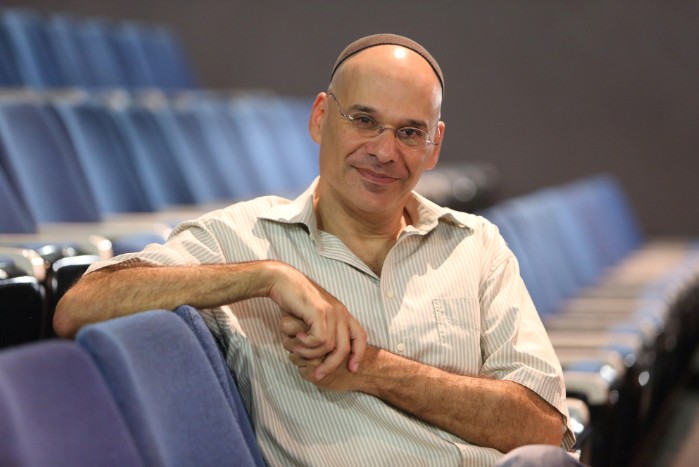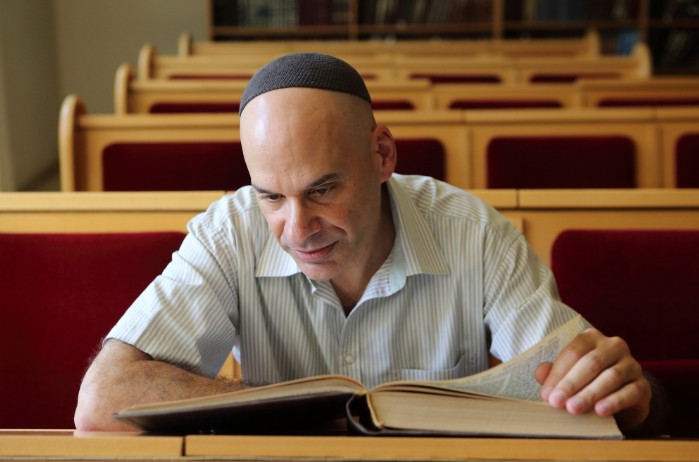Ben Levine: "I Began Observing Shabbat and Kosher Overnight"
Ben Levine, a theater personality, shares that his journey of embracing Judaism matured over almost twenty years, culminating in an instant decision to keep Shabbat and kosher. Today, he is fully observant and infuses his theater work with messages of closeness.

Ben Levine is a theater personality from a family of theater figures: his uncle, Hanoch Levine, was one of Israel's most renowned and influential playwrights. His father, David Levine, served as the house director and artistic director of Habima Theater in the 70s and 80s. His brother, Assaf, was also an actor. However, Assaf returned to Judaism about a decade ago, and five years ago, Ben joined him in observing Torah and mitzvot.
"My return to Judaism happened literally overnight – I began keeping Shabbat and kosher within a day," says Ben Levine. "I remember it was Friday evening, and I went to a play. Throughout the play, I was plagued by awful feelings of guilt and an internal struggle: one side was saying, 'This is not right, what are you doing here,' while the other said, 'Relax.' After the play, I went to a bar that a friend of mine had recently opened. She was delighted to see me and asked what I wanted, and suddenly, I heard myself unexpectedly ask, 'Is this kosher?' She was stunned and told me it definitely wasn't. Then she added, 'Are you keeping kosher?' and I replied, 'Apparently, yes'..."
The next day, he already observed Shabbat and threw out all his old dishes. "I didn't know what to do with my dishes, so I just tossed them and lived on disposables for a while."
Despite the dramatic nature of his step, Levine clarifies that twenty years of 'ripening' preceded it. "For twenty years, my subconscious told me that one day I would return to Judaism, and I'd say 'no, no,' until it happened."
 Ben Levine (Photo: Yaakov Nahumi / Flash 90)
Ben Levine (Photo: Yaakov Nahumi / Flash 90)His brother, who preceded him in the journey, was his constant guide throughout. "He helped me a lot. I didn't know anything. I didn't even know how to pray. All the time, I would call him: Are we doing the Priestly Blessing today? When does the fast begin? He had a lot of patience, luckily for me."
"Initially, I was full of enthusiasm," Levine laughs as he recalls those days. "For example, of 16 waking hours, I would pray for 14... I didn't know the prayers at all and insisted on saying every word, so I would finish the morning prayers, look at the clock, and say, 'Well, in half an hour it's time for Mincha.'... I felt an enormous thirst for everything Jewish. Every free moment I had, I studied and read religious books. I learned Gemara, Tanya, Mussar... I felt like a dry sponge that was finally absorbing water."
These days, Ben Levine is presenting a new play he wrote, directed, and acts in. The premiere of 'Full House in Three Acts' is scheduled for tomorrow at the Tmuna Theater in Tel Aviv. In his theatrical career, Levine has held almost every possible role: actor, director, playwright, and dramaturg. In the new play, he fills all the roles – including returning to acting after many years. "It's a play about three army friends who meet for an evening of card games and suddenly discover that one of them has returned to Judaism. I've been working on this play for three and a half years, and it's inspired by many events I experienced during my own return to Judaism. As a theater person, of course, I take things to the extreme, but many elements, like the process of returning described, are very personal. That's also why I chose to return to acting after so many years. I felt it was right because I connect with the character and the story."
 (Photo: Yaakov Nahumi / Flash 90)
(Photo: Yaakov Nahumi / Flash 90)The play reflects Ben's experiences facing his social circles after drawing closer to Judaism, he says. "I had friends who envied the courage to take this step. I have a friend who, when he heard I returned to Judaism, asked what I was learning. When I answered that I was studying Gemara and Tanya, he replied, 'You have no idea how jealous I am of you.' On the other hand, there were friends who were completely put off by the change. They can't understand how suddenly you're wearing a kippah and tzitzit, blessing over everything – it seems fake to them, like you're trying to suddenly speak with a foreign accent, when everyone knows you're Israeli."
Levine says he maintained friendships with all his old friends, even those who were alarmed by his spiritual change. "I don't think it's right to disconnect, to part ways and give up on friends. If Hashem wanted me to be born religious, I would have been born in Bnei Brak. He placed me in a secular world that ultimately led me back to Judaism. Therefore, my friends in this world have great significance for me, even if they see primitiveness in what I'm doing. I think my return makes them feel something inside, and that's what causes resentment. It was like that for me too when I was secular. I know I wasn't stupid or an idiot – I simply had my path and my journey that I needed to go through, and that's how it is for everyone."
Ben Levine now uses his theater skills to promote themes of repentance and closeness. "The Lubavitcher Rebbe would say, there is nothing good or bad in itself, rather, it depends on the content you fill it with. I try to fill it with positive themes of closeness, no foul language, nor inappropriate things. Theater has immense power, and I try to harness it for good."

